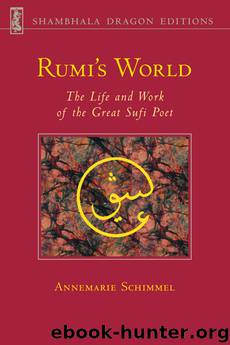Rumi's World by Annemarie Schimmel

Author:Annemarie Schimmel
Language: eng
Format: epub
Publisher: Shambhala
Thus, each of us will see the results of our works in one way or another, and it is up to us to do whatever we can to achieve a happy life thereafter. The elect, however, those who have lost themselves in God and in Love—will find their own recompense in eternal flight.
Maulana was not a systematic thinker, and therefore it is not easy to find out how he imagined the human being and the relationships between the different parts of body, soul, spirit, and heart. One thing is clear, however: like his predecessors, Maulana knows that the human person consists of several layers, beginning with the body, which consists of the four elements and manifests the traditional four temperaments. But the body is merely a husk that surrounds the spirit; it is like a guest house in which new guests constantly come and go. The outward body essentially is unimportant for men; were not the Prophet and his uncle Abu Jahl of the same family, hence similar in appearance? And yet how vast was the distance between the two! The one was destined to be the final prophet for humanity; the other remained an accursed infidel to the very end. This body is rather like a thornbush that hides the beautiful spirit; or it is like a rope tied to the foot of the soul. Maulana illustrates this situation by way of the story of the mouse who fell in love with a frog and tied him by a rope to her foot; understandably, both perished, as will readily happen if the body overpowers the spirit. It should therefore be educated by fasting lest it become too disobedient. Maulana once called the body “dust on the mirror Spirit”—a dust that hides the radiant spiritual substance that is found beneath it. Elsewhere he sees it as a “vessel for the wine Soul,” imagery that at least invests the body with a certain value. For after all, without the body not much can be achieved. In keeping with traditional physiology, Maulana speaks of the five senses, but he is quick to remind the listener that each of the five senses corresponds to an inner sense by which man can understand the higher realities. The senses as they appear to us are like horses; they need an intelligent rider (generally, Reason or Intellect) who can guide them to the right path, direct them on the way of obedience.
A second component of the human being is the nafs, the soul, which, understood absolutely, usually refers to the lower instincts or base faculties. However, the nafs can be educated, as becomes clear from the three references in the Koran: the nafs ammāra bi’s-sū, “that which incites to evil” (Sura 12/53); the nafs lawwāma, the “blaming soul” (Sura 75/2), which by and large corresponds to our concept of conscience; and finally the stage of nafs muṭma’inna, “the soul at peace” (Sura 89/27), the stage from which it can return to its Lord. Maulana, like most
Download
This site does not store any files on its server. We only index and link to content provided by other sites. Please contact the content providers to delete copyright contents if any and email us, we'll remove relevant links or contents immediately.
| Ancient, Classical & Medieval | Anthologies |
| British & Irish | Japanese & Haiku |
| Love Poems | Regional & Cultural |
| Themes & Styles | United States |
| Women Authors |
The Universe of Us by Lang Leav(15076)
The Sun and Her Flowers by Rupi Kaur(14517)
Adultolescence by Gabbie Hanna(8927)
Whiskey Words & a Shovel II by r.h. Sin(8018)
Love Her Wild by Atticus(7758)
Smoke & Mirrors by Michael Faudet(6192)
Wiseguy by Nicholas Pileggi(5786)
The Princess Saves Herself in This One by Amanda Lovelace(4976)
Love & Misadventure by Lang Leav(4847)
Memories by Lang Leav(4800)
Milk and Honey by Rupi Kaur(4748)
Bluets by Maggie Nelson(4556)
Too Much and Not the Mood by Durga Chew-Bose(4348)
Pillow Thoughts by Courtney Peppernell(4284)
Good morning to Goodnight by Eleni Kaur(4234)
The Poetry of Pablo Neruda by Pablo Neruda(4109)
Algedonic by r.h. Sin(4063)
HER II by Pierre Alex Jeanty(3611)
Stuff I've Been Feeling Lately by Alicia Cook(3458)
